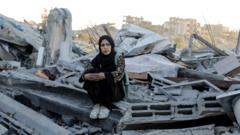Despite the increased aid and supposed easing of conflict, Rose underscored the profound trauma experienced by the population and highlighted that most structures, such as homes and roads, have been severely damaged or destroyed. The WHO is also prioritizing the rehabilitation of Gaza's healthcare system, with plans to address urgent medical needs as the crisis persists. Moreover, humanitarian needs are accelerating and remain critical due to Israeli military actions previously restricting aid access, amid contrasting views between Israeli authorities and UN officials regarding the conditions of aid delivery. This complex interplay underscores a critical humanitarian crisis, with thousands now displaced and significant areas potentially facing famine as winter approaches, all while wrestling with the structural limitations of aid organizations under newly imposed Israeli regulations.
While families begin to return to their homes in the rubble of northern Gaza, the majority face a daunting path of recovery that extends well beyond material assistance. Tension remains over the functioning of UNRWA amid new Israeli legislation that targets its operations, leading to fears of increased risks for humanitarian workers in the region.
As these challenges unfold, the international community watches closely, hoping for a resolution that addresses both the immediate and long-term needs of Gaza's population amidst an ongoing humanitarian disaster.
While families begin to return to their homes in the rubble of northern Gaza, the majority face a daunting path of recovery that extends well beyond material assistance. Tension remains over the functioning of UNRWA amid new Israeli legislation that targets its operations, leading to fears of increased risks for humanitarian workers in the region.
As these challenges unfold, the international community watches closely, hoping for a resolution that addresses both the immediate and long-term needs of Gaza's population amidst an ongoing humanitarian disaster.



















